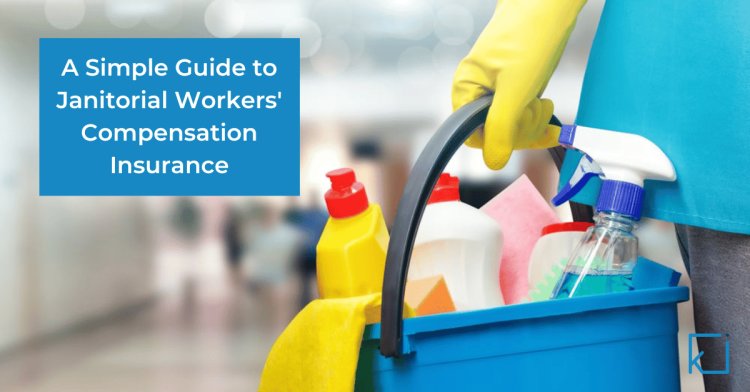In the realm of workplace safety and legal protections, workers’ compensation insurance stands as a fundamental pillar. For janitors, who play a crucial role in maintaining cleanliness and safety in various environments, this insurance is not just a legal requirement but a necessary safeguard against unforeseen risks. In this comprehensive guide, we'll explore why janitors need workers' compensation insurance, the benefits it provides, and the implications for employers and employees alike.
Understanding Workers' Compensation Insurance
Workers' compensation insurance is a type of coverage that provides financial and medical benefits to employees who suffer job-related injuries or illnesses. This insurance covers a range of costs, including medical expenses, lost wages, and rehabilitation services. It also provides benefits to dependents in case of a work-related fatality.
The Role of Janitors in the Workplace
Janitors, often referred to as custodians or maintenance workers, are essential in keeping commercial and residential spaces clean and operational. Their responsibilities typically include:
- Cleaning and Disinfecting: Janitors sanitize restrooms, clean floors, and maintain cleanliness in high-traffic areas.
- Maintenance Tasks: They might perform minor repairs, replace light bulbs, and handle basic maintenance issues.
- Waste Management: Collecting and disposing of waste, recycling, and ensuring proper waste management protocols are followed.
- Safety Inspections: Checking and ensuring that the premises adhere to safety standards.
Given these diverse responsibilities, janitors are exposed to various hazards that increase their risk of injury.
Common Risks Faced by Janitors
- Slips, Trips, and Falls: Wet floors, uneven surfaces, and clutter can lead to falls, which are among the most common workplace injuries.
- Exposure to Hazardous Chemicals: Cleaning agents and disinfectants may contain harmful chemicals that can cause respiratory issues, skin irritations, or chemical burns.
- Musculoskeletal Injuries: Lifting heavy equipment or supplies, as well as repetitive tasks, can lead to back injuries, strains, and sprains.
- Infectious Diseases: Handling waste and cleaning in areas with high contamination risks can expose janitors to infectious diseases.
- Accidents with Equipment: Use of machinery such as floor buffers or vacuum cleaners can result in injuries if not handled properly.
The Importance of Workers' Compensation Insurance for Janitors
1. Financial Protection: Workers' compensation insurance provides financial support to janitors who are injured on the job. This includes coverage for medical expenses, which can be substantial depending on the nature and severity of the injury. Additionally, it compensates for lost wages during the recovery period, ensuring that employees do not face financial hardship due to work-related injuries.
2. Legal Compliance: In many jurisdictions, workers' compensation insurance is a legal requirement. Employers are obligated to provide this coverage to their employees, including janitors. Failing to comply with these regulations can result in significant legal penalties and financial repercussions for businesses.
3. Peace of Mind: Knowing that they are covered by workers' compensation insurance allows janitors to perform their duties with greater peace of mind. They can focus on their work without the constant worry of potential financial burdens from accidents or injuries.
4. Rehabilitation Support: Workers' compensation insurance often includes coverage for rehabilitation services. This can be crucial for janitors recovering from serious injuries, helping them to regain their ability to work and return to their job more quickly.
5. Protection Against Lawsuits: Workers' compensation insurance can also provide legal protection for employers. By having this insurance, businesses can reduce their liability in the event of workplace injuries. The insurance covers the costs associated with injury claims, minimizing the risk of lawsuits.
Key Considerations for Employers
1. Ensuring Proper Coverage: Employers should verify that their workers' compensation insurance policy adequately covers all aspects of their employees' work, including the specific risks faced by janitors. This involves working with an insurance provider who understands the unique needs of the custodial industry.
2. Implementing Safety Protocols: To reduce the risk of injuries, employers should implement and enforce safety protocols. This includes providing proper training on the safe use of cleaning chemicals and equipment, as well as ensuring that all janitorial staff are aware of and follow best practices for maintaining a safe work environment.
3. Regular Risk Assessments: Conducting regular risk assessments can help identify potential hazards in the workplace. By addressing these risks proactively, employers can minimize the likelihood of accidents and injuries, thereby reducing the number of claims and associated costs.
4. Employee Education: Educating janitors about their rights under workers' compensation insurance and the procedures for reporting injuries can improve safety outcomes. Employees should be aware of how to file a claim and what steps to take if they experience a workplace injury.
5. Record Keeping: Accurate record-keeping is essential for managing workers' compensation claims effectively. Employers should maintain detailed records of all incidents, injuries, and claims to ensure compliance with legal requirements and to support the insurance claim process.
The Impact on Business Operations
1. Financial Implications: While workers' compensation insurance represents an additional cost for businesses, the financial protection it offers can outweigh the potential costs of workplace injuries. By investing in comprehensive coverage, businesses can avoid larger expenses related to lawsuits, medical bills, and lost productivity.
2. Employee Morale: Providing workers' compensation insurance demonstrates a commitment to employee well-being, which can positively impact morale and job satisfaction. Janitors who feel valued and protected are more likely to be engaged and motivated in their roles.
3. Reputation Management: Businesses that prioritize workplace safety and employee protection enhance their reputation. A strong safety record and commitment to workers' compensation insurance can attract quality employees and build trust with clients and customers.
4. Operational Efficiency: Effective management of workers' compensation claims and safety protocols can improve overall operational efficiency. By reducing the frequency and severity of workplace injuries, businesses can maintain smoother operations and reduce downtime.
Workers' compensation insurance is a critical component of workplace safety and employee protection, especially for janitors who face a range of hazards in their daily tasks. This insurance not only provides essential financial and medical support for injured employees but also helps businesses comply with legal requirements and manage risks effectively.
For janitors, having workers' compensation insurance offers peace of mind, knowing that they are covered in the event of an accident or injury. For employers, it represents a necessary investment in employee well-being and operational stability. By understanding the importance of workers' compensation insurance and implementing effective safety measures, businesses can ensure a safer work environment for their janitorial staff and protect themselves from potential liabilities.





















